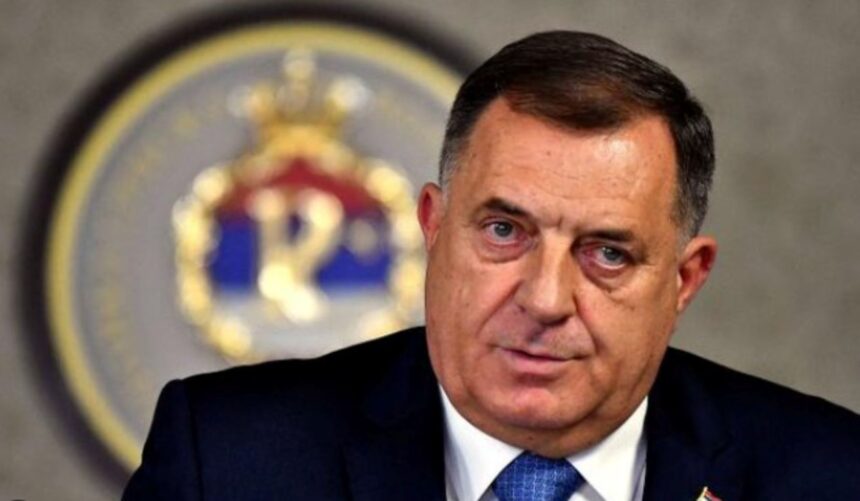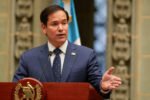Republika Srpska President Milorad Dodik has announced plans to hold a referendum in response to the revocation of his mandate by Bosnia and Herzegovina’s Central Election Commission (CIK), deepening the ongoing political crisis in the country, reports DW.
The CIK acted after a court found Dodik guilty and sentenced him to one year in prison and six years of political disqualification. However, Dodik has challenged both the legal and political legitimacy of the decision, insisting that only the people of Republika Srpska (RS) can remove him from office.
“I am here and I will stay. I have no intention of leaving. I will beat them with their own weapon – politics,” Dodik declared.
The referendum, he said, will ask the public:
“Should we accept the destruction of the Constitution of Republika Srpska?”
Legal Disputes and Political Defiance
Dodik has petitioned the court to replace his prison sentence with a fine of 36,500 KM (€18,500), a move some analysts view as an implicit recognition of the verdict.
Despite the conviction, Republika Srpska’s constitution does not recognize court rulings as a basis for removing a president. Only resignation or impeachment are considered valid grounds, creating a legal gray area that fuels the current standoff.
Meanwhile, the CIK is preparing to call early presidential elections, but it remains unclear whether RS authorities will allow them to proceed. Dodik and his allies claim the commission has overstepped its authority, accusing it of violating constitutional order and acting under foreign influence.
“Surrender is not an option,” Dodik wrote on X (formerly Twitter), calling the entire process a “political decision disguised as justice.”
Parallel Election Systems and Court Rulings
In 2024, the RS National Assembly passed its own Election Law, transferring election oversight from the state-level CIK to a newly created RS Election Commission. However, Bosnia’s Constitutional Court annulled that law, declaring it unconstitutional.
Despite this ruling, RS officials insist the law remains valid, and there are growing concerns that Dodik’s government could conduct elections outside the legal framework recognized by the central government.
Symbolic Referendum with Political Weight
While the upcoming referendum would have no legal binding power, it is viewed as a political instrument aimed at galvanizing public support and challenging the state judiciary and central institutions.
Analysts note that Dodik’s political leverage is weakening, as former allies distance themselves and his options narrow. In a tactical move, his party has called for the formation of a “government of national unity”, putting pressure on opposition parties to support him or face blame for any instability.
Tensions Spread Across Institutions and Borders
The fallout from the decision has spread beyond Dodik himself. RS Vice President Ćamil Duraković, who welcomed the mandate revocation, reported being stripped of all official privileges, including his advisors, government vehicle, and housing.
In contrast, Bosniak officials in Sarajevo have applauded the CIK’s actions, emphasizing the importance of respecting state institutions and upholding the rule of law.
Regional reactions have been sharply divided. In Belgrade, Serbian officials described the ruling as a political attack on Serbs, while Deputy Prime Minister Ivica Dačić warned:
“Whoever thinks we’ll stay silent is deeply mistaken.”
Support also came from abroad. Hungarian Prime Minister Viktor Orbán and the Russian Embassy in Bosnia have sided with Dodik, condemning the verdict as politically motivated.
Historical Parallels and Opposition Boycotts
This is not the first time Republika Srpska has attempted to use referenda in times of political stress. In 2016, the RS government held a referendum on RS National Day (January 9), which was later annulled by the Constitutional Court and dismissed by RS authorities as a mere “opinion poll.”
This time, opposition figures are largely refusing to participate. Nebojša Vukanović, a key opposition leader, announced a boycott, stating:
“This is just a campaign tool. I won’t participate in creating tensions.”
Déjà Vu for Dodik
The crisis also brings a historic twist. Back in 1999, Dodik supported the removal of then-RS President Nikola Poplašen. Now, he finds himself in the same position, fighting the same kind of institutional measures he once endorsed.
As legal and political tensions escalate, the central question remains:
Can early elections be held in Republika Srpska – and will anyone recognize them?







